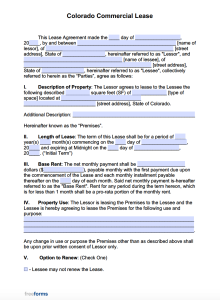
The Colorado lease agreement establishes the terms of a contract between a lessor (landlord) and lessee (tenant) pertaining to a rental property/unit. The general terms that should be agreed upon and recorded within the document include the price of rent, length of the tenancy, and any provisions related to the occupancy. To ensure the document is valid, the landlord must provide the state’s required disclosures & addendums along with each party’s signatures.
Rental Application – Creates a ledger for potential tenants to record their information for submission in consideration to lease a property. There is a limitation on application fees in the state of Colorado stating that the fee charged cannot exceed the cost incurred by the landlord to run background checks and investigate the applicant.

Commercial Lease Agreement – Is specific to leasing real estate with the sole purpose of accommodating a business entity.
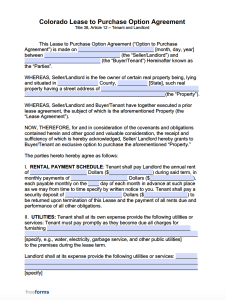
Lease to Own Agreement – Allows users to rent a dwelling for a specified time period while simultaneously providing the lessee with the exclusive rights to purchase the property.
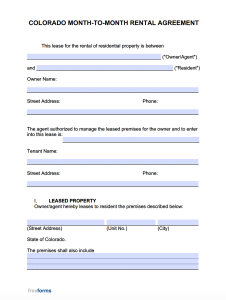
Month-to-Month Lease – A short-term contract that enables participants to rent a dwelling for a maximum of one (1) month at any given time. The contract may be voided by either party as long as thirty (30) days warning is provided.
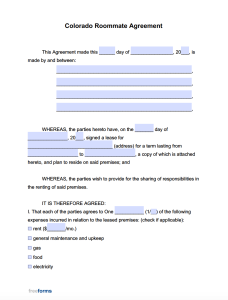
Roommate Agreement – A document that can be executed when an owner or lessee of a residential property would like to rent out one of the rooms contained within the dwelling.
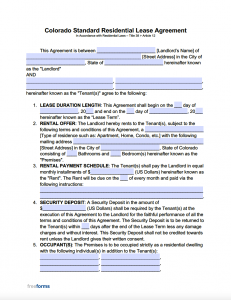
Standard Lease Agreement – Goes over the contractual obligations regarding the rental of home or apartment in a written format.
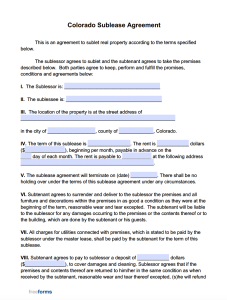
Sublease Agreement – Utilized when a tenant would like to re-rent a property to what is called a “sub-tenant”.
The state’s government website provides an extensive booklet on Landlord/Tenant Rights that cite the legal statutes that apply to each section.
Colorado has no required disclosures that need to be included within the lease agreement.
Lead-Based Paint (42 U.S. Code § 4852d) – Although there are no disclosures demanded by the state, the federal government does enact a law that requires a disclosure pertaining to any lead-paint and/or lead-paint hazards that may be contained within the property being sold or rented. (This is only necessary if the building was constructed before 1978.)
Rent is to be paid according to the terms recorded within the lease agreement. The state does not provide an established grace period.
There is no ordinance that determines a set fee for late rent payments. Both parties must agree upon the charge prior to the completion of a lease agreement.
If the tenant supplies the landlord with a check to pay rent and it bounces, the tenant is liable to pay back the amount of the check plus reimbursement for any damages the landlord accrued when cashing or depositing the check (§ 13-21-109). The service fee may not exceed the amount of $20.
Local government does not enforce a limit on security deposit amounts. This should be discussed and inserted within the rental agreement prior to signing.
The lessor is obligated to provide the lessee with their security deposit no more than sixty (60) days after terminating the tenancy and relinquishing the property; this may be less depending on the provisions made within the agreement (§ 38-12-103).
Although it is recommended to alert the tenant at least 24 hours before entering the premises, state law does not require a notice of entry in order to access the property.